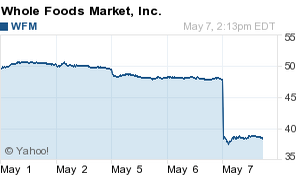Whole Foods Market Inc. (Nasdaq: WFM) stock has slipped about 20% today (Wednesday) after the company disappointed with soft Q2 earnings and lackluster full-year guidance.
Shares of the nation's largest natural foods grocer slumped in morning trading to $37.31, a 52-week low. The stock clawed back some in the afternoon session, but shares remained down a sharp 19% just after noon. 
After the close Tuesday, Whole Foods reported a per-share profit of $0.38 on revenue growth of 9.7% to $3.32 billion. That was shy of the forecast of $0.41 on revenue of $3.34 billion. Comparable same-store sales rose a slight 4.5%, marking the specialty supermarket's slowest growth rate in four years.
Even more uninspiring was the company's forward guidance.
The Austin, Texas-headquartered company reduced its per-share FY2014 profit to $1.52 to $1.56, down from earlier predictions of $1.58 to $1.65.
Additionally, Whole Foods now expects sales growth of 10.5% to 11% for the fiscal year ending in September. That's down from the previous forecast of 11% to 12%.
The company also lowered projections for same-store sales growth to 5% to 5.5%, down from prior estimates of 5.5% to 6.2%. That's notably lower than Whole Food's historic growth rate of 7% to 8%. Even more dispiriting, the company's current weaker outlook followed similar downward predictions made in February and November.
While other companies blamed a harsh winter for weak earnings performance, Whole Foods didn't - and couldn't - use that as its excuse. What's to blame is by no means seasonal. It's more serious and troubling...
Why Whole Foods (WFM) Stock Is Sinking
Whole Foods used to own the healthy food niche, but that's no longer the case.
"Competition is more intense right now than we've possibly ever experienced before," John Mackey, founder and Co-CEO of Whole Foods, said on a conference call with investors.
Key competitors such as privately held Trader Joe's, The Fresh Market Inc. (Nasdaq: TFM), and Sprouts Farmers Market Inc. (Nasdaq: SFM) have been stealing customers from Whole Foods. And traditional supermarket chains and superstores such as Kroger Co. (NYSE: KR) and Wal-Mart Stores Inc. (NYSE: WMT) have expanded offerings to offer a vast selection of specialty foods.
"For a long time Whole Foods had the field to ourselves," Mackey said. "That was nice, but we don't anymore."
When the original Whole Foods opened in Austin, Texas, in 1980, there were fewer than half a dozen natural foods supermarkets in the United States.
Now, there are thousands.
According to the Nutrition Business Journal, sales of natural and organic foods rose from $6 billion in 1998 to $48 billion in 2012. Meanwhile, specialty grocers' shares fell to 38% from 74%, with supermarkets taking up the slack.
In an attempt to better compete, Whole Foods has begun offering "less pricey" items. Shelves are stocked with more store-branded foods. Conventional produce is now available along with organic fruits and vegetables.
The chain is also heavily investing in technology to improve the shopping experience and attract new customers.
Whole Foods acknowledged it will take time for customers to recognize they can get deals at its stores and thus buy more items and get their friends to shop there. Thanks to its commanding presence, it reckons it can do that.
Despite growing competition and slumping sales, Whole Foods remains the leader in the specialty grocery segment. It has some 379 stores peppered across the United States, U.K., and Canada. The aim is to have more than 500 stores in 2017, and as many as 1,200 longer out. Over the last 10 years, Whole Foods has tripled annual sales to some $13 billion.
"We see the world evolving pretty quickly, with the different choices customers have," co-CEO Walter Robb said. "We have a point of view that [our efforts to lower prices] are going to work, and they are going to continue to build long-term growth for the company."
But, as Mackey told Bloomberg last year, "Whole Foods always takes the long-term view of things." He added Whole Foods "wins people over time."
The slow process hasn't helped the stock...
WFM Stock Feels the Pain
Impatient investors aren't hanging around. And, analysts have soured on the stock. A flurry of downgrades followed the company's bland Q2 report, with at least six research firms slashing their WFM ratings.
The biggest bear among the bunch was Cantor Fitzgerald, which cut its rating to "Sell" from "Hold" and reduced its price target to $38 from $48. Cantor analyst Ajay Jain wrote Whole Foods has "significantly disappointed investors for six out of the last seven quarters." The stock's multiple (price to earnings ratio) is likely to decline going forward, Jain added.
Before the Q2 earnings release, Whole Food shares were off 17% year to date. Wednesday's plunge leaves the stock down some 27% so far in 2014.
Today's Top Story: The real skirmish in Ukraine is not being covered by the mainstream media. And these are the companies that may decide the fate of the country...
Related Articles:
- Bloomberg:
Whole Foods Fattens Up in Grocery Retail - Whole Foods Market:
- MarketWatch:
- CNBC:
Whole Foods Cuts 2014 Forecasts Again as Competition Intensifies


